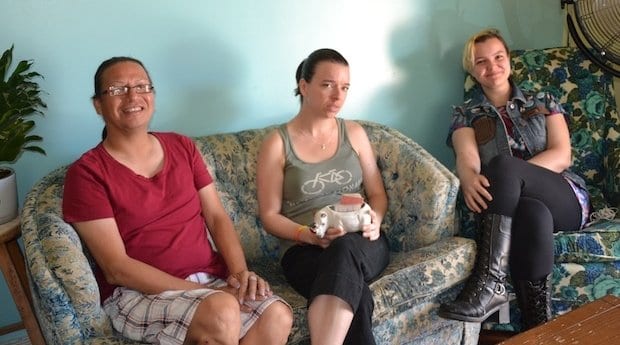Despite internal conflicts in previous years, the 2014 board of Capital Pride says it’s working efficiently and cohesively as a group, even though most of its members are relatively new to the board.
“There’s a real sense on our board of wanting to sort of move in a positive direction,” says Jodie McNamara, who was elected chair last October after serving as vice-chair of operations last Pride. “Everyone’s very aware of the history of Pride in that there’s a sense of sort of — it’s mired in this cloud of conflict, or it has been in the past. There’s a sense of wanting to make good on the promise that is Pride, for the community in Ottawa.”
“Little conflicts aren’t terribly important,” says 19-year-old Hannah Watt, who joined the board midway through 2013. “We’re running something incredibly huge, so let’s just run that and worry about little personal conflicts and little political vendettas and things like that later. Let’s worry about this big important community event that we’re doing. It’s far more important than anyone’s political agenda or individual egos.”
“The majority of the board has only been involved for within the last year or two,” McNamara notes. “In an organization with a 32-year history, absolutely that’s notable.”
In addition to McNamara and Watt, the new board includes treasurer Giselle Gardipy, outreach director Ashley Blackwood, assistant treasurer Stephanie Lavergne, secretary Rob Swartz and vice-chair of operations Andrea Guilbault.
“I have the most seniority on the board at the moment, in terms of involvement with the organization and with the board,” McNamara says. “It sort of fell in my lap a little bit and I gave it some thought, and I was like, ‘Well, all right — let’s do this!”
The newness of the board has meant a closer working relationship among members, particularly when it comes to the sharing of information. “I think everyone’s a little bit more willing to ask questions,” Watt says. “There’s a little bit more information sharing at the very least, so we don’t drop any balls and so we don’t get nervous about anyone forgetting anything because we’re all so new to it.”
For Gardipy, who also joined the board partway through last year, taking charge of Capital Pride’s financial organizing presented “a big learning curve.” She says the organization now works with a bookkeeping service and a team of auditors to keep everything on track.
McNamara says that having such a new, inexperienced group head the organization is a disadvantage but that the board is committed to learning and moving forward.
Programming for this year’s Pride tends to move away from parties, with a greater focus on family and educational events. This shift, Gardipy says, is largely because of Capital Pride’s community partners, which include Gender Mosaic, Amnesty International and a number of international embassies, including Sweden and the United States.
Watt says the community partners Capital Pride is working with, and the programming they’re sponsoring, are indicative of Ottawa’s personality as a city. “Ottawa’s not a major party city,” she says. “Our LGBTQ scene has a lot of parents, it has a lot of youth, it has a lot of people in school, and so it’s less about dancing, it’s less about clubs, and it’s more about learning, togetherness, growth and community building.”
This year Capital Pride will also host the Free to Love conference, which will include speaker panels on LGBT athletes, the pink-dollar phenomenon and trans youth.
“There’s been a shift away from the board looking inward and asking itself what it wants and a shift to looking outward to the community and asking what they want,” McNamara says. “That sort of has manifested itself in a more robust community partners program.”
The embassies are also sponsoring a series of international film screenings, while an ongoing partnership with the Ten Oaks Project has enabled the return of the family-friendly Picnic in the Park.
“One of the things I’ve found troubling in watching Pride over the years is this tendency to insist on a focus on one part of the community and sort of accepting the falling off the map of other parts of the community as collateral damage, or, you know, ‘You can’t please everyone,’ that kind of language,” McNamara says. “The truth is that I think we have to try to be there for everyone as much as is possible.”
Parties and glitter are still an important part of Pride, and the people who love them are valuable members of the community, McNamara hastens to add. “The mainstream sort of denies us as a whole, gay men included . . . I think that we have an ethical responsibility to not repeat that particular mistake within our community.”


 Why you can trust Xtra
Why you can trust Xtra


